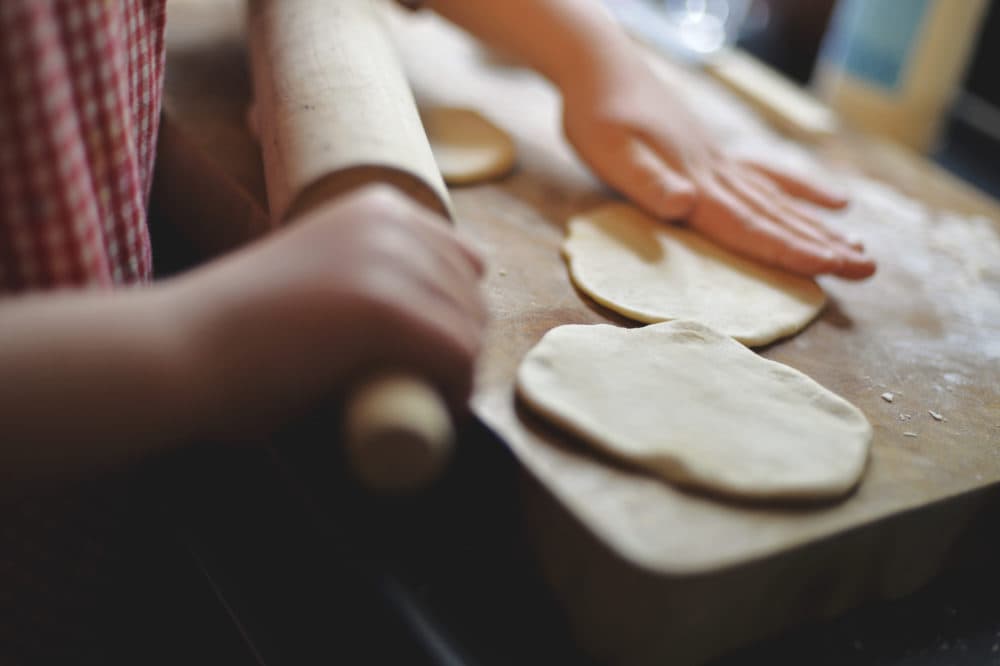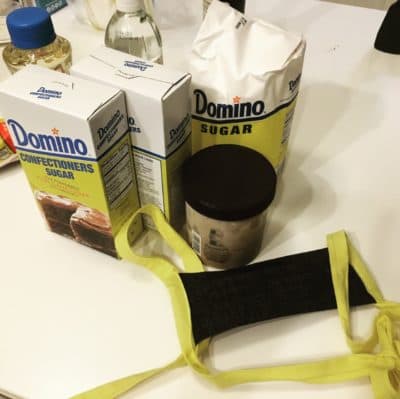Advertisement
Commentary
What Do You Do In A World Gone Mad? You Bake

A few days after September 11, 2001, unsettled to our cores and feeling helpless to heal or fix or change the world, my friend Jenna and I baked cupcakes. They were patriotic cupcakes — at least, that’s what we called them. We decorated them with red, white, and blue frosting and sloppy American flags and brought them to a fire station on Beacon Hill.
It wasn’t much — just a gesture — but it somehow felt appropriate, the mix of sugar, carbs, and solidarity. Baked goods are what we bring to friends, what we offer as welcome, what we line up to sample after funerals. And for late-twentysomethings at the turn of the century, September 11 was a kind of funeral for our youth, a marker of lives lost and innocence shattered. We had to confront the world for real now, and we started by setting the oven to 350 degrees.
In truth, the cupcakes were the smallest part of the comfort. The real work was the act of baking itself. We weren’t the first people, past or present, to respond to a crisis beyond the scope of our comprehension by retreating to the measuring of ingredients, the setting of timers, the meticulous following of recipes and rules.
I’m not a very good baker. I can follow directions, sift flour, vigorously mix and gently fold, and usually come up with something that tastes approximately right. But the visuals, I get all wrong. My chocolate chip cookies bleed into each other, oozing across the pan like amorphous blobs. My cakes resemble half-deflated footballs. And, ugh, the frosting: Where some people form perfect mountains of buttercream and draw calligraphy-grade letters out of sugar, my decorating channels the fine-motor skills of a 3-year-old. I seldom bring baked goods to parties because I know they’d wind up rejected, pariahs of the dessert table, like the kids who weren’t picked for kickball in the schoolyard. In ordinary times, I buy Oreos and store-made pies and limit myself to stovetop cooking, where one tiny mistake won’t derail your meal, and you can always add more water or more salt.
September 11 was a kind of funeral for our youth ... We had to confront the world for real now, and we started by setting the oven to 350 degrees.
But when the COVID pandemic hit, in the spring of 2020, I found myself compulsively baking again. On the second day of lockdown, beside myself with uncertainty and fear, I made a giant chocolate chip cookie in a skillet. A month later, I ventured to a store for the very first time to pick up baking supplies; I was terrified by the masks and the Plexiglass shields, but I was out of flour and powdered sugar. Later on, as we stayed huddled in the house, we baked to pass the time. My son declared that he wanted to make a red velvet cake, so we did, and it was hideous, but it tasted good. Many people I knew were doing the same, letting sourdough rise and churning out cookies and cakes. Our homes lacked the presence of friends, so we replaced them with the smells and the rituals of the kitchen, and shared our work through photos on social media.

Once the fiercest lockdown ended, my household baking waned. I returned to my ordinary habits, buying processed cookies and making banana bread only when I stumbled across a black banana in the pantry. This summer, my backyard apple tree, which is usually battered by inchworms, yielded a surprise bumper crop for the first time in years. So I’ve been making apple crisps, which is practically cheating; it’s allowed to look irregular and sloppy.
That’s not crisis baking. It’s relaxed baking, vaccinated baking, baking without the need to impose an extra layer of control on the uncertainty of the world. Crisis baking is about taking comfort in the order — the rigid roadmap that takes you to a predictable place, so long as you adhere to every step. Crisis baking is for times like the fall of 2001, when danger seemed suddenly close, our place in the world was thrown into question, and we needed to cut through the chaos for one hopeful hour at a time.
The other day, I met a woman who started working at a bakery during the pandemic. It was something she’d always wanted to do, so — like many of us after this past year — she wondered what she had been waiting for and did it. She told me the secret to baking right: A gram scale. It takes the mystery out of measuring ingredients, she said; no uneven flour measurements or variable pinches. Everything comes out predictably, exactly as it’s supposed to be. Life doesn’t work that way, not even remotely. But with baking, the end can be sweet.
